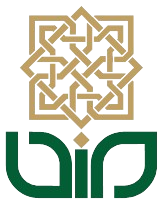The Sharia Banking Study Program of the Faculty of Islamic Economics and Business held a general lecture with the theme “The Role and Challenges of Sharia Banking in the Economy” on Wednesday (14/10/2020).
This event is part of the socialization series for new students of the Sharia Banking program for the academic year 2020/2021. The Sharia Banking General Lecture featured speakers with expertise in Sharia banking, including Hanawijaya (Director of Bank Jateng Syariah) and Andang Lukitomo (Former Culture and Change Management Head BSM).
The event was hosted by Mr. Faisal Reza, a 2018 Sharia Banking student. The recitation of the holy verses of the Qur’an was performed by Ms. Inayatul Muna, and the event was moderated by Mrs. Dian Nuriyah Solissa, SHI, M.Si. The event was conducted online using video conferencing.
The event was attended by the Dean of the Faculty of Islamic Economics and Business, Dr. Afdawaiza, M.Ag, the Head of the Sharia Banking Study Program, Ruspita Rani Pertiwi, S.Psi, M.M, and other Sharia Banking lecturers, as well as all new students for the 2020/2021 academic year of the Sharia Banking program.
The general lecture commenced with a speech from Mrs. Ruspita Rani Pertiwi, S.Psi, M.M., the Head of the Sharia Banking Study Program. In her address, she stated that the general lecture serves as an initial foundation for Sharia banking students, especially those in the Faculty of Islamic Economics and Business.
Following the opening remarks, Dr. Afdawaiza, M.Ag, delivered a speech, highlighting the relevance of the lecture’s theme in the current situation and emphasizing the opportune moment for Sharia Banking to enhance its role in the economy during the Covid-19 pandemic.
The characteristics of Sharia banking differ from conventional banking, as Sharia banking operates on a profit-sharing financing model facilitated through musyarakah and mudharabah financing products, in contrast to the interest-based system used in conventional banking. Consequently, the presence of Sharia banking is expected to have a positive impact on the growth of the real sector. One crucial area for development to drive real sector growth is micro, small, and medium enterprises (MSMEs), which currently play a pivotal role in the national economy. There are high expectations for Sharia banks to contribute to the development of MSMEs. However, the national Sharia financial system faces fundamental challenges that hinder various stakeholders from fully leveraging Sharia’s potential as a benefit for all. The primary challenge for Sharia financial institutions lies in addressing issues stemming from an interest-based framework and currency standard instability, particularly amidst the Covid-19 pandemic.
The event comprised two sessions. The first session featured Hanawijaya, Director of Bank Jateng Syariah, who elaborated on Sharia Banking and its role in the contemporary economy. This was followed by the second session, which delved into the topic of Human Resource Competence in enhancing the quality of Sharia Banking, led by Andang Lukitomo, Former Head of Culture and Change Management at BSM.
Contributor: Alfi Ayu Ilhamna, Editor: AN
